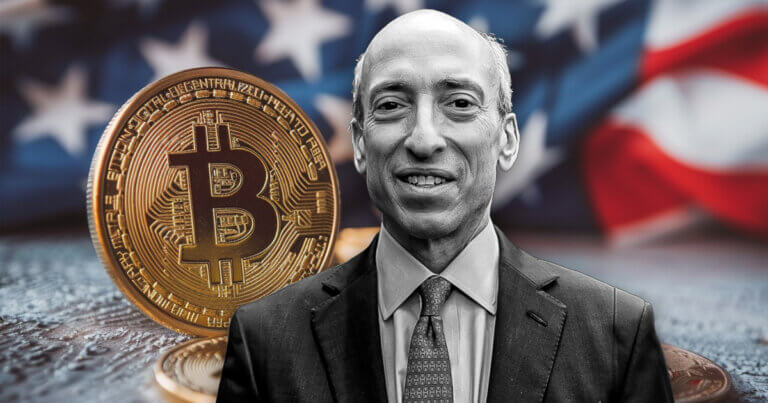 Gary Gensler claims SEC helped crypto, takes credit for Bitcoin ETFs, dismisses altcoins and hints at resignation
Gary Gensler claims SEC helped crypto, takes credit for Bitcoin ETFs, dismisses altcoins and hints at resignation Gary Gensler claims SEC helped crypto, takes credit for Bitcoin ETFs, dismisses altcoins and hints at resignation
Gensler also excluded Ethereum and stablecoins from other digital assets which he deems 'non-compliant.'

Gary Gensler, chair of the SEC / SEC.gov. Public Domain.
Gary Gensler, chair of the U.S. Securities and Exchange Commission (SEC), delivered a detailed address on Nov. 14 at the PLI Annual Institute on Securities Regulation. His remarks highlighted the SEC’s approach to crypto regulation while repeatedly identifying the difference the SEC sees between altcoins and Bitcoin.
The language used by Gensler also hinted at the possibility of stepping down following Donald Trump’s election and the President-elect’s explicit criticism of Gensler’s tenure. He ended his speech with what may be perceived as a farewell message,
“The SEC and its staff. It’s a remarkable agency… It’s been a great honor to serve with them, doing the people’s work…
I’ve been proud to serve with my colleagues at the SEC who, day in and day out, work to protect American families on the highways of finance.”
In what could be one of his last statements as SEC chair, Gensler took the time to reaffirm Bitcoin’s classification as a non-security asset, distinguishing it from the vast majority of the crypto market. Gensler said,
“Not every asset is a security. Former Chairman Clayton and I have both said that bitcoin is not a security, and the Commission has never treated bitcoin as a security.
Our focus, rather, has been on some of the 10,000 or so other digital assets, many of which courts have ruled were offered or sold as securities”
This stance contrasts with the agency’s enforcement actions against other digital assets, which have collectively represented 5–7% of the SEC’s regulatory focus since 2018.
The speech highlighted the SEC’s rationale for targeting specific altcoins. Gensler emphasized that compliance with securities laws ensures market trust and investor protection. “History has shown for 90 years that robust securities regulation creates trust in markets and fosters innovation,” he said. However, he acknowledged that many digital assets (besides Bitcoin) still lack sustainable use cases, highlighting speculative investment and illicit activities as key concerns.
A critical point in Gensler’s remarks was his focus on highlighting his approval of exchange-traded products (ETPs) for Bitcoin futures, spot Bitcoin, and Ethereum. Gensler spotlighted how these approvals mark a departure from earlier SEC chairs that limited access to physically backed crypto ETFs.
According to Gensler, by approving the spot Bitcoin and Ethereum ETFs, the SEC helped to offer benefits like disclosure, lower fees, and competition, contrasting them with “non-compliant crypto-asset markets.”
Trump’s victory in the November election adds a new dimension to Gensler’s tenure. The President-elect has publicly pledged to replace Gensler, a stance that may explain the chair’s reflective tone. “The SEC’s effective administration promotes trust,” Gensler remarked, seemingly framing his legacy as part of a broader institutional mission.
Bitcoin, which has surged over 30% since the election results were announced, illustrates the market’s sensitivity to political and regulatory forces. Analysts have connected the rally to optimism around potential deregulatory policies under the Trump administration. Bitcoin reached $93,400 on Nov. 13, fueled by expectations of reduced regulatory scrutiny.
Gensler’s remarks also contextualized crypto’s place in the global financial ecosystem. He noted that aside from Bitcoin, Ethereum, and stablecoins, the remaining crypto market—worth approximately $600 billion—constitutes less than 20% of total crypto capitalization. This subset, he argued, poses the greatest challenges for compliance due to its fragmented and speculative nature.
Amid speculation about his resignation, Gensler concluded his speech with personal reflections on the importance of securities regulations, likening their role to “rules of the road” in financial markets. Whether his tenure ends soon or extends into the next administration, Gensler’s approach to crypto regulation has left a lasting imprint on the sector.
Gensler seems to be presenting his stint as SEC chair as pro-Bitcoin, pro-Ethereum, and pro-stablecoins. However, Coinbase, Kraken, Crypto.com, Robinhood, Ethereum stakers, and many other industry participants may not be convinced by his pitch. From this speech, he appears to believe that Bitcoin fundamentally differs from altcoins and that only Ethereum and stablecoins are free from SEC purview.



 Farside Investors
Farside Investors 















































































